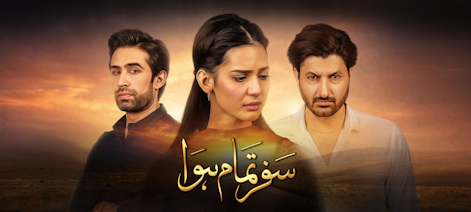“Safar Tamam Hua” had a rocky start and continued to feel like an underwhelming show in its initial stages. Fortunately, at the halfway point, it managed to pick up a lot and despite having some confusing, somewhat irritating characters, it has presented an interesting story. Starring Ali Rehman Khan, Madiha Imam, Syed Jibran, Samina Ahmed, Noreen Gulwani, Haaris Waheed, Sonia Nazir, Annie Zaidi and others in main roles, the story has been written by Rahat Jabeen and directed by Shehrazade Sheikh.
At the beginning of the episode, Jamal (Syed Jibran) is seen shedding crocodile tears over Anoushay (Madiha Imam) and Sami’s (Ali Rehman Khan) engagement, pouring his heart out to Nazo (Noreen Gulwani) over his belief that Sami murdered Rija. Unfortunately, if this scene is supposed to be effective in any way, it’s not. It’s not possible to feel for Jamal after all the stunts he has pulled. One cannot forget how blasé he was at Rija’s death and how his only goal in accusing Sami at that time was to push Anoushay away from him. Are we supposed to believe now that he truly cares about who murdered Rija? Still, it’s enough to pull Nazo in and so, while Anoushay and Sami are reveling in their newly engaged bliss (which is very sweet and endearing), Nazo and Jamal hatch a plan.
Post the engagement, Sami’s mother (Samina Ahmed) asks Sami if he’s happy and he answers in the affirmative, both Sami and Anoushay finally content after a long time. She smiles and ends Sami to the kitchen to make chai and it’s there that Nazo makes her move. She corners Sami and attacks him, forcing him to grab her arms – leading to her making a claim, in front of the entire family, that Sami attacked her. The audience finds themselves immediately groaning, feeling as though they know what’s coming with this story moving once again in a circular motion – but surprise! This is not what happens and what does happen puts a huge smile on the face of the viewer. Khala, finally fed up of Nazo’s antics and Jamal’s lies, slaps Nazo and Anoushay rips into her as well, making it known that the entire family is aware that this is a plan of Nazo and Jamal. This is such a relief to see this family reacting logically and finally trusting and recognizing that Sami is not “that type.” In this moment, Jamal is disowned and cries about being neglected his entire life, being left to care for himself and raise himself, forced to be this way. Unfortunately, Jamal’s character has been written as such a skeezy one, it’s difficult to feel for him for even a moment. While he may have some sort of middle child syndrome attitude (despite not being a middle child) of neglect, it’s not enough to excuse all the bad things he has done over the course of the last 20 episodes.
The greatest expose in episode 20 is Nabeel’s (Haaris Waheed). After Nabeel and Ayeza’s (Sonia Nazir) daughter is diagnosed with a genetic disorder similar to that of Rija’s, Nabeel is seen breaking down. His mother (Annie Zaidi) finally recognizes that Nabeel’s behavior over the last several months has not been normal and after overhearing his words, realizes Nabeel had something to do with Rija’s death. She questions him and the truth comes spilling out. It’s still not clear WHY Nabeel put his hands on Rija, but what is clear is that her death was not malicious or intentional – but he is still responsible. The truth not only comes out in front of his mother and Ayeza, but also Khala, Anoushay and Sami, leaving Nabeel distraught and unable to face anyone.
Mujhe Vida Kar Episodes 9 – 12: Sadia and Rida Tolerate More Abuse Than Necessary
The true performer in this episode is, again, Haaris Waheed. Nabeel is the most complex character on this show, a man who has been a good guy in his life, raised by a good mother to be a good person. But unfortunately, he has done something so terrible that it not only affected his attitude (and his sin meter), but it has also impacted his future, now facing divorce and raising a child with disabilities. Haaris Waheed is giving one of his career-best performances. It must be said that there is an aspect of this that is potentially problematic – Nabeel having a child with disabilities as a “punishment.” Having a special needs child is not a punishment, so it’s wrong of this to be portrayed on Pakistani television like this. This could send a very bad message to society at a time when stories should be educating rather than spreading backwards ideas like this. This is on the writer and director, of course, not the performers. The team should be careful when dealing with stories like this. Still, everyone on the show is doing a good job and despite “Safar Tamam Hua” having some weak points throughout the show, it has emerged as an interesting story in the long run. One does have to appreciate that they have not stretched out the “mystery” factor beyond necessity and kept the storyline moving in the latter half of the show. Overall, “Safar Tamam Hua” is a show that has managed to recapture interest once again.
